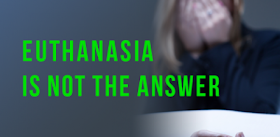Executive Director, Euthanasia Prevention Coalition
Petition: Reject euthanasia Bill C-7 (Link).
Many people have stated that Bill C-7 prevents euthanasia (MAiD) for mental illness alone. Recently the Canadian Bar Association End of Life Working Group, that support euthanasia for mental illness, recommended that:
Mental illness should not be excluded from the definition of “serious and incurable illness, disease or disability”.I am convinced that Bill C-7 already permits euthanasia for mental illness.
People have said, Bill C-7 does appear to prevent euthanasia for "mental illness". Section (2.1) of the bill states:
For the purposes of paragraph (2)(a), a mental illness is not considered to be an illness, disease or disability.
This section of Bill C-7 will not prevent euthanasia for mental illness or psychological reasons alone because it does not define the terms "mental illness" or "psychological suffering."
Let me explain.
Previous to the Quebec Truchon court decision, a person didn't qualify for MAiD based on psychological reasons alone since the law required that a person's "natural death be reasonably foreseeable," which was not defined.
Canada's euthanasia law states that a person qualifies for euthanasia (MAiD) if:
Let me explain.
Previous to the Quebec Truchon court decision, a person didn't qualify for MAiD based on psychological reasons alone since the law required that a person's "natural death be reasonably foreseeable," which was not defined.
Canada's euthanasia law states that a person qualifies for euthanasia (MAiD) if:
the illness, disease or disability or that state of decline causes them enduring physical or psychological suffering that is intolerable to them and that cannot be relieved under conditions that they consider acceptable.
1. Bill C-7 removes the requirement in the law that a person’s natural death be reasonably foreseeable in order to qualify for assisted death. Therefore, people who are not terminally ill can die by euthanasia. The Quebec court decision only required this amendment to the law, but Bill C-7 went further.
2. Bill C-7 permits a doctor or nurse practitioner to lethally inject a person who is incapable of consenting, if that person was previously approved for assisted death. This contravenes the Supreme Court of Canada Carter decision which stated that only competent people could die by euthanasia.
3. Bill C-7 waives the ten-day waiting period if a person's natural death is deemed to be reasonably foreseeable. Thus a person could request death by euthanasia on a "bad day" and die the same day. Studies prove that the “will to live” fluctuates.
4. Bill C-7 creates a two track law. A person whose natural death is deemed to be reasonably foreseeable has no waiting period while a person whose natural death is not deemed to be reasonably foreseeable would have a 90 day waiting period before being killed by lethal injection.
5. As stated earlier, Bill C-7 falsely claims to prevent euthanasia for people with mental illness. The euthanasia law permits MAiD for people who are physically or psychologically suffering that is intolerable to the person and that cannot be relieved in a way that the person considers acceptable. However, mental illness, which is not defined in the law, is considered a form of psychological suffering.
- Stop the extension of euthanasia by Bill C-7 (Link).
- More than 15,000 Canadians have died by euthanasia (Link).
- Canadians oppose euthanasia for mental illness and child euthanasia (Link).


See this youtube ....
ReplyDeleteUnderstanding God’s Plan for the End of Life - Joni Eareckson Tada